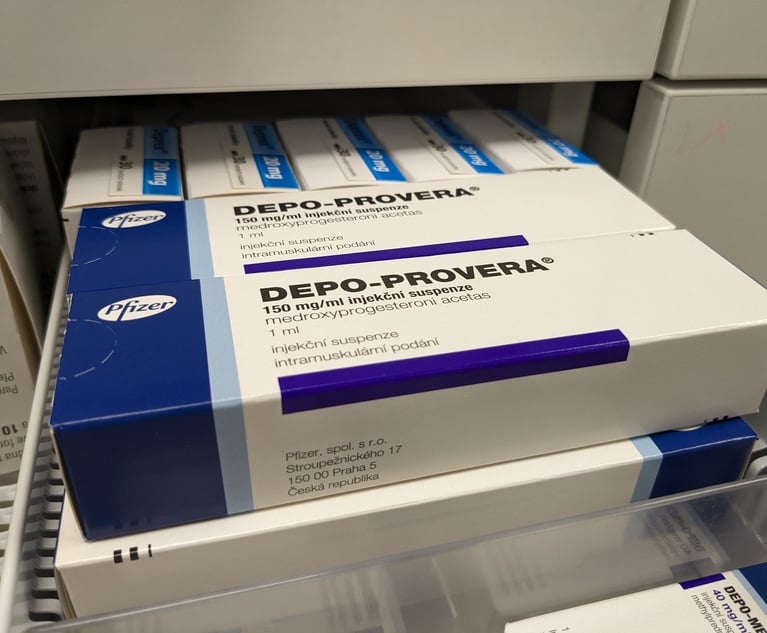 University of Pennsylvania crest. Photo: Bryan Y.W. Shin, via Wikimedia Commons
University of Pennsylvania crest. Photo: Bryan Y.W. Shin, via Wikimedia CommonsThird Circuit Revives Beard-Related Discrimination Claims Against UPenn
The U.S. Court of Appeals for the Third Circuit has reinstated discrimination claims that a former University of Pennsylvania police officer brought against the school for allegedly refusing to accommodate a skin condition he suffered that left him unable to shave.
August 12, 2019 at 05:36 PM
4 minute read
The original version of this story was published on The Legal Intelligencer
The U.S. Court of Appeals for the Third Circuit has reinstated discrimination claims that a former University of Pennsylvania police officer brought against the school for allegedly refusing to accommodate a skin condition he suffered that left him unable to shave.
A unanimous three-judge panel of the federal appeals court Aug. 9 reversed a ruling from the U.S. District Court for the Eastern District of Pennsylvania that tossed Joseph Lewis’ claims alleging constructive discharge, violation of the Americans with Disabilities Act and discrimination for failure to provide reasonable accommodations.
The ruling comes more than a year after the case, Lewis v. University of Pennsylvania, went to trial on disparate treatment and hostile work environment claims. That trial ended with a defense verdict.
According to Timothy Creech, who is representing Lewis, last week’s ruling means Lewis can now bring his substantive claims before a jury, whereas during the previous trial he had been unable to argue that his rights had been violated or that the school had failed to reasonably accommodate his condition.
“We felt that the district court had taken away his right to have a jury decide whether his rights were violations and whether this pushed him out of his job as a police officer—a job he loved,” Creech said. “Mr. Lewis is looking forward to the opportunity to be vindicated in front of a jury, and we’re pleased that the Third Circuit has given us that opportunity.”
The university’s police department requires officers to be clean-shaven, but Lewis claimed shaving irritated his face and led to increased risk of infection due to pseudofolliculitis barbae, a condition known as razor bumps, which is common among black men. Lewis claimed he was subjected to discriminatory treatment by supervisors and colleagues, who mocked him for not adhering to the department’s grooming policy. Lewis also claimed he was taken off his normal beat, denied vacation time, and was retaliated against for requesting a disability accommodation to not shave.
He was placed on leave, and ultimately resigned.
Lewis sued contending, among other things, that the university failed to engage in reasonable accommodations, or allow for an exemption to the school’s requirement that employees provide a medical certificate every 60 days.
Although U.S. District Judge Gene E.K. Pratter dismissed those claims, the Third Circuit panel, led by Judge D. Brooks Smith, said Pratter did not use the proper standard and that Lewis did not need to expressly request the accommodation.
“Applying the correct legal standard, there is a fact question as to whether Penn engaged with Lewis in good faith,” Smith said. “Even if Penn did act in good faith, it is for the jury to decide whether permanently exempting Lewis from both shaving and the certification requirement would have been a reasonable accommodation.”
The panel also said the district court should further consider whether the university has any business reason for requiring employees to provide a medical certificate every 60 days, since the ADA prohibits medical examinations and inquiries unless they stem from a business-related purpose.
As part of the ruling, the court also allowed Lewis to reinstate claims for retaliation under the Family and Medical Leave Act, which he had withdrawn after the district court dismissed the constructive discharge claim.
Brooks was joined by Judges Michael Chagares and Joseph Greenaway.
The University of Pennsylvania was represented by Leslie Greenspan of the Tucker Law Group. Greenspan did not return a message seeking comment.
This content has been archived. It is available through our partners, LexisNexis® and Bloomberg Law.
To view this content, please continue to their sites.
Not a Lexis Subscriber?
Subscribe Now
Not a Bloomberg Law Subscriber?
Subscribe Now
NOT FOR REPRINT
© 2024 ALM Global, LLC, All Rights Reserved. Request academic re-use from www.copyright.com. All other uses, submit a request to [email protected]. For more information visit Asset & Logo Licensing.
You Might Like
View All

From 'Confusing Labyrinth' to Speeding 'Roller Coaster': Uncertainty Reigns in Title IX as Litigators Await Second Trump Admin
6 minute read
New Class Action Points to Fears Over Privacy, Abortions and Fertility
Trending Stories
Who Got The Work
Michael G. Bongiorno, Andrew Scott Dulberg and Elizabeth E. Driscoll from Wilmer Cutler Pickering Hale and Dorr have stepped in to represent Symbotic Inc., an A.I.-enabled technology platform that focuses on increasing supply chain efficiency, and other defendants in a pending shareholder derivative lawsuit. The case, filed Oct. 2 in Massachusetts District Court by the Brown Law Firm on behalf of Stephen Austen, accuses certain officers and directors of misleading investors in regard to Symbotic's potential for margin growth by failing to disclose that the company was not equipped to timely deploy its systems or manage expenses through project delays. The case, assigned to U.S. District Judge Nathaniel M. Gorton, is 1:24-cv-12522, Austen v. Cohen et al.
Who Got The Work
Edmund Polubinski and Marie Killmond of Davis Polk & Wardwell have entered appearances for data platform software development company MongoDB and other defendants in a pending shareholder derivative lawsuit. The action, filed Oct. 7 in New York Southern District Court by the Brown Law Firm, accuses the company's directors and/or officers of falsely expressing confidence in the company’s restructuring of its sales incentive plan and downplaying the severity of decreases in its upfront commitments. The case is 1:24-cv-07594, Roy v. Ittycheria et al.
Who Got The Work
Amy O. Bruchs and Kurt F. Ellison of Michael Best & Friedrich have entered appearances for Epic Systems Corp. in a pending employment discrimination lawsuit. The suit was filed Sept. 7 in Wisconsin Western District Court by Levine Eisberner LLC and Siri & Glimstad on behalf of a project manager who claims that he was wrongfully terminated after applying for a religious exemption to the defendant's COVID-19 vaccine mandate. The case, assigned to U.S. Magistrate Judge Anita Marie Boor, is 3:24-cv-00630, Secker, Nathan v. Epic Systems Corporation.
Who Got The Work
David X. Sullivan, Thomas J. Finn and Gregory A. Hall from McCarter & English have entered appearances for Sunrun Installation Services in a pending civil rights lawsuit. The complaint was filed Sept. 4 in Connecticut District Court by attorney Robert M. Berke on behalf of former employee George Edward Steins, who was arrested and charged with employing an unregistered home improvement salesperson. The complaint alleges that had Sunrun informed the Connecticut Department of Consumer Protection that the plaintiff's employment had ended in 2017 and that he no longer held Sunrun's home improvement contractor license, he would not have been hit with charges, which were dismissed in May 2024. The case, assigned to U.S. District Judge Jeffrey A. Meyer, is 3:24-cv-01423, Steins v. Sunrun, Inc. et al.
Who Got The Work
Greenberg Traurig shareholder Joshua L. Raskin has entered an appearance for boohoo.com UK Ltd. in a pending patent infringement lawsuit. The suit, filed Sept. 3 in Texas Eastern District Court by Rozier Hardt McDonough on behalf of Alto Dynamics, asserts five patents related to an online shopping platform. The case, assigned to U.S. District Judge Rodney Gilstrap, is 2:24-cv-00719, Alto Dynamics, LLC v. boohoo.com UK Limited.
Featured Firms
Law Offices of Gary Martin Hays & Associates, P.C.
(470) 294-1674
Law Offices of Mark E. Salomone
(857) 444-6468
Smith & Hassler
(713) 739-1250









